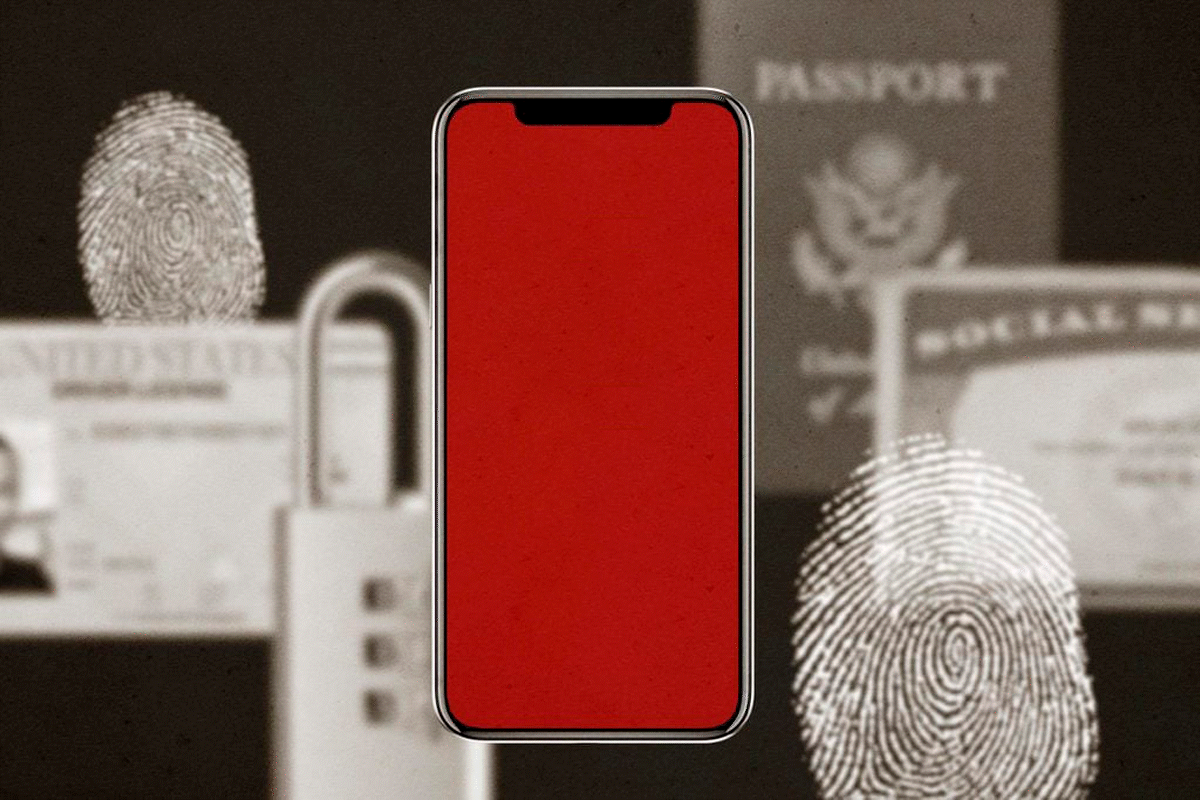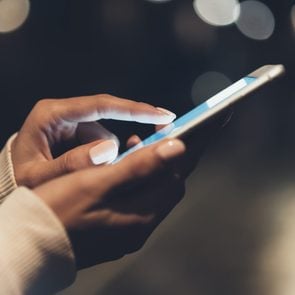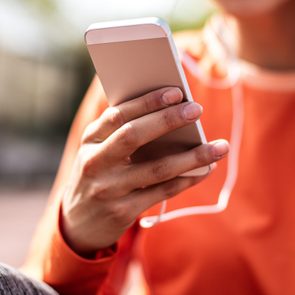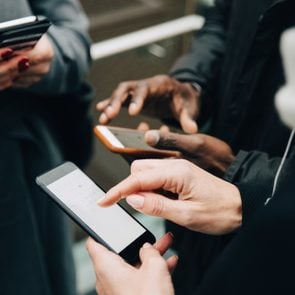8 Things to Never Store on Your Smartphone
Updated: Jun. 03, 2024
Using your cell phone as a master archive for your personal information? Please be aware this convenience may come at a price.

Back in the days of yore, leaving your house meant you needed to carry your wallet, which almost invariably contained your cash, a form of picture identification, your insurance card, your credit cards, photos of your kids, maybe even a spare check. These days, you have to ask yourself if you really even need to own a wallet. After all, there are quite a few things that you should immediately stop keeping in your wallet (if you haven’t already). But even more importantly, don’t you have most of that stuff stored on your phone?
Full disclosure: That was a trick question.
The fact is, there are things you should never store in your cell phone—because doing so can leave you vulnerable to an invasion of privacy, identity theft, and straight-up theft. Here’s what you need to think twice about storing on your phone.
Your passwords
The irony of passwords is that they’re supposed to make our data secure, and, increasingly, we’re advised to always use a “strong” password and never use the same password more than once. As a result, it’s increasingly difficult to remember passwords without a cheat sheet of some kind. But if you actually use one—especially one you store on your cell phone in the form of a note, a document, or even in autofill—you’re putting your data at risk. If you were to lose possession of your phone, someone might easily see your “cheat sheet,” but even if you always have your phone on your person, whatever passwords you store on your phone can end up stored in the cloud, putting your accounts at risk—even accounts that aren’t tied to your phone.
Instead of keeping a list of your passwords or relying on autofill, consider downloading a well-rated password manager such as Keeper, Dashlane, or LastPass, so that all of your passwords can be accessed by you using one strong master password.
Your fingerprint
If you really want to keep your cell phone secure, don’t be tempted into using fingerprint identification to open your phone (or any of its apps or accounts). There are several imaginable scenarios in which someone in your physical presence could force a log-in using your fingerprint. Examples include a thief using physical force or a late-night post-party “prank.” While there is nothing to say a thief couldn’t force you to input your password, the simple fact is that a phone that requires a password to unlock it requires more steps to unlock and is therefore more secure.
In addition, there is always the possibility your fingerprint can be stolen. While it’s a slight risk, the loss would be immense, which makes using your fingerprint something to think twice about. Check out these iPhone hacks you never knew about.
Your face
Anyone who has struggled with getting their phone to recognize their face when they’re holding their phone at a weird angle might argue that storing your face in your phone as a password alternative is more secure than a fingerprint. While that may be true, when it comes to unlocking your phone, the fact remains that facial recognition is still less secure than simply using a password.
Your very personal photos and videos
Maybe you’re really good about maintaining your social media accounts as cleanly and privately as possible, but what about the photos and videos you store on your phone? If you have photos you wouldn’t want your parents, spouse, children, or boss to see, then you shouldn’t store those photos on your smartphone, especially since the contents of your phone may well be stored on the cloud. But if you feel you must store those naughty photos somewhere, then consider storing them not on your cell phone but on a personal computer only you have the password to open. You might also consider storing them in a password-protected album or app. Learn more about how to hide private photos on an iPhone or iPad.
Any photos containing private information
Remember the days when losing your wallet meant reconstructing your whole life to figure out which credit cards and forms of ID you needed to cancel and replace? Now, all you have to do is take a photo of each item and store it on your phone, right? Well, that’s certainly a convenient way to keep track of “what’s in your wallet.” But it can also leave your information vulnerable to hacking, particularly if your photos are stored on the cloud. As with photos you’d rather not see leaked, you might wish to consider storing them on a personal computer only you have access to, and/or a password-protected album or app.
Anything personal if you’re using an employer-issued phone
There’s no such thing as a free lunch. There’s also no such thing as a free work phone. That phone you were issued by your employer comes at a steep price: your privacy. If your employer provided you with a phone to support remote work or for any other reason, you should have no expectation of privacy for anything you do on that phone. For your personal life, the best option is using a separate phone and phone number. One budget-minded option is a burner phone. Here are 10 times you’ll be surprised you need a burner phone.
Your online bank account
If you think online banking is the greatest thing since sliced bread, you’re not alone. Nor are you wrong to think so. But the convenience online banking affords—the ability to bank anywhere, anytime—comes at a cost: your privacy. Carrying your bank account with you on your phone means that you’re risking losing control of it in the event you lose your phone…or even lose track of an old phone that you no longer use.
To manage the risk, you might consider avoiding doing your online banking on your phone. Instead, do it on a computer that never leaves your home. If you find that you simply must take your online banking with you wherever you go, just be sure to use a strong, unique password to unlock your banking app. Find out ways the government might be spying on you right now.
Your home address
Storing your home address on the navigation apps you use most makes getting home from anywhere super-easy and convenient. But it can also leave you vulnerable. If a thief ends up with your phone in their physical possession, they can simply click on Waze or Google Maps and see what you’ve stored as “home,” or “work,” for that matter. It is also not inconceivable that your home or work address could wind up hacked or otherwise leaked. If you like keeping those addresses handy so you don’t have to re-input them time and time again, then at least make finding your home or work address a bit more challenging to would-be criminals by giving them a code word as an identifier, like “gym.” Next, find out the apps security experts never have on their phone.





















